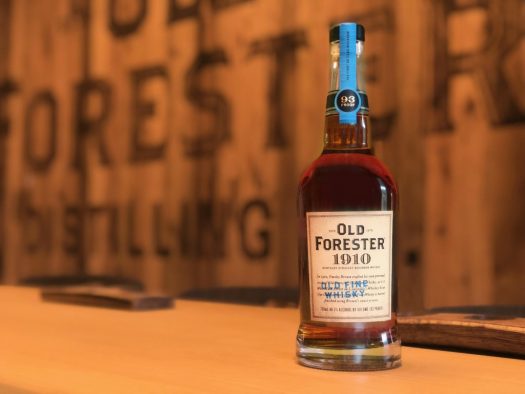Review: Old Forester Whiskey Row Series – 1910 Old Fine Whiskey
Review: Old Forester Whiskey Row Series – 1910 Old Fine Whiskey
Old Forester’s Whiskey Row Series, which celebrates America’s bourbon heritage, has come to an end. Three expressions have previously been released — 1870 Original Batch, 1897 Bottled in Bond, and 1920 Prohibition Style — and now the final expression, 1910 Old Fine Whiskey, has arrived.
Astute readers will recall that 1920 was our top bourbon pick of the year in 2016, which means that 1910 has some awfully big shoes to fill.
Before we taste, let’s let Old Forester explain what we’re getting into.
Old Forester, America’s First Bottled Bourbon, will release the fourth and final expression in the Whiskey Row Series this month: the double barreled, 1910 Old Fine Whisky.
Like others in the series, 1910 Old Fine Whisky represents a specific point in Old Forester’s nearly 150-year-old history. In October 1910, a fire caused the bottling line to be shut down for an indefinite period of time. Complicating matters, there was a vat of mature whisky waiting to be bottled. Otherwise facing ruin, this whisky was instead stored in new, charred oak containers to rest until the line could be repaired. The resulting product, the first documented double-barreled whisky, was both different from Old Forester and remarkable enough to become an entirely new expression – Very Old Fine Whiskey.
“There are often pieces of our brand’s history that we happen upon by accident. Years ago, while searching through archives, we discovered a case of bourbon with a label I hadn’t seen before. We uncovered that Very Old Fine Whisky not only carried a great story, but a previously unknown heritage of double-barreled expressions,” said Chris Morris, Master Distiller, VP Whiskey Innovation, Brown-Forman.
Today, mimicking this historic bottling, this unique expression of Old Forester has undergone a second barreling in a lightly toasted, heavily charred barrel. “Mature Old Forester enters a second barrel at 100 proof, just as it did in 1910,” said Old Forester Master Taster Jackie Zykan. “The second barrel is charred nearly to the point of incineration. This low entry proof allows more of the wood’s sugars to be dissolved into the whiskey, resulting in a smooth, sweet whisky with a clean, spicy finish – yielding an exceptional character.”
Whew! So there you go: This is Old Forester that has gone through a second aging in a barrel with light toast and heavy char, bottled slightly over proof.
Without further ado… can it ever measure up to 1920?
Sure enough, it can. It’s amazing stuff, straight out of the gate. The nose feels appropriately woody, but beneath the barrel char lie notes of eucalyptus, black pepper, cloves, burnt sugar, and some baking spices — all well integrated into an aggressive, almost pushy whole, that offers just a hint of smoke. That’s not a bad thing. It’s just the prelude to what is revealed as an incredibly deep and complex whiskey once you delve into the palate. Here, the whiskey takes you on a journey that ventures far and wide, starting with chewy, lightly smoky barrel char and venturing from there into a boldly fruity experience that pours on notes of coconut, apricots, some mint, and a fistful of spices.
At 93 proof, it’s just racy enough to fire up the mind and soul, but not so hot as to be even remotely oppressive — in other words, it’s just about perfect. At long last, the finish arrives, where it sees a clear dark chocolate note developing and which pairs particularly beautifully with what’s come before.
Is it as good as 1920? That’s a tough call, as these are very different whiskeys with diverging personalities. I love the sweet fruit and impressive attack of 1920, but the brooding depth of 1910 makes it equally hard to put down. Ultimately, I have to call it a tie.
In the final analysis, though, 1910 really does stand on its own. And considering both the depth of the experience and the price, it’s an absolutely great buy.
93 proof.
A / $55 / oldforester.com [BUY IT NOW FROM CASKERS] [BUY IT NOW FROM FROOTBAT]







